Can a Chaplain Be Sued? Legal Considerations


Chaplains serve vital roles in various settings, including hospitals, military, prisons, and public institutions. However, their actions often navigate complex legal terrains involving First Amendment protections, liability risks, and constitutional boundaries. This article explores the legal considerations that impact chaplains’ ability to perform their duties without risking lawsuits, highlighting protections, liabilities, and the evolving judicial landscape.
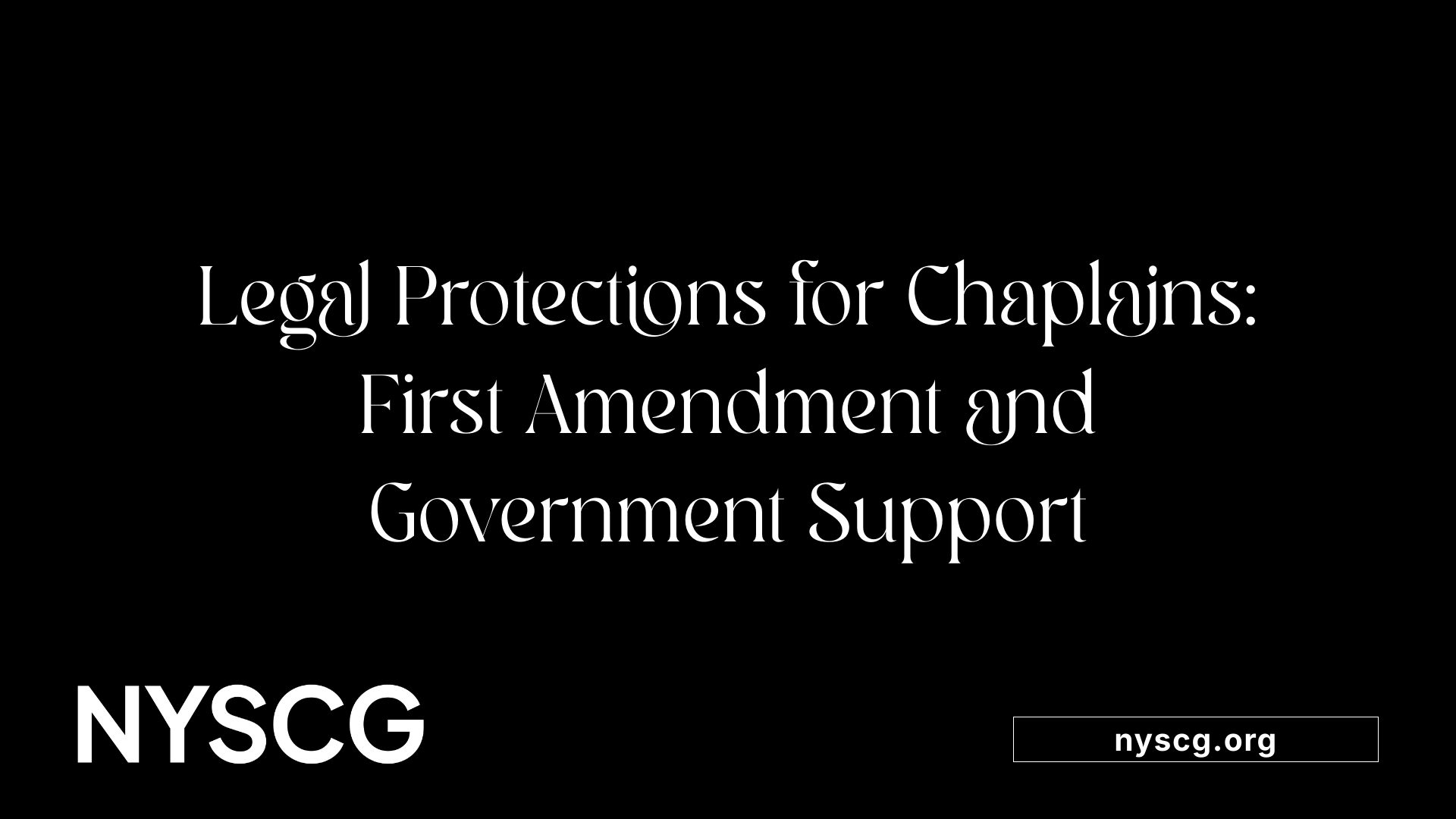
Chaplains benefit from significant legal protections rooted in the First Amendment, which guards religious practice and ensures the government does not endorse any particular faith. This protection means that chaplains engaged in religious activities—such as prayer, spiritual counseling, and worship—are generally shielded from lawsuits that might seek to restrict these expressions.
Courts have repeatedly validated government-funded chaplaincy programs, like those in the military and hospitals. They highlight that these programs usually serve secular purposes such as providing spiritual support without promoting religion. To pass constitutional muster, these programs must avoid excessive government entanglement with religious doctrine and remain voluntary.
Laws such as the Military Chaplains Act offer formal legal support to chaplains, affirming their right to perform their religious duties without fear of censorship or legal backlash. As long as chaplains conduct themselves within the boundaries of constitutional protections and do not engage in proselytizing that could be coercive, their actions are protected. This legal framework aims to preserve religious free exercise while maintaining constitutional neutrality in government settings.
| Legal Aspect | Description | Supporting Examples |
|---|---|---|
| First Amendment | Protects free exercise of religion and prevents government endorsement | Courts uphold military, hospital chaplaincy programs |
| Legislation | Formalizes protections | Military Chaplains Act |
| Principles | Avoidance of excessive entanglement, voluntariness | Courts emphasize secular purpose and neutrality |
In summary, chaplains enjoy legal immunities provided by the First Amendment, which facilitate their religious expression in various public and private settings. These protections, however, are contingent upon their adherence to constitutional standards that prevent coercion and maintain government neutrality in religious matters.
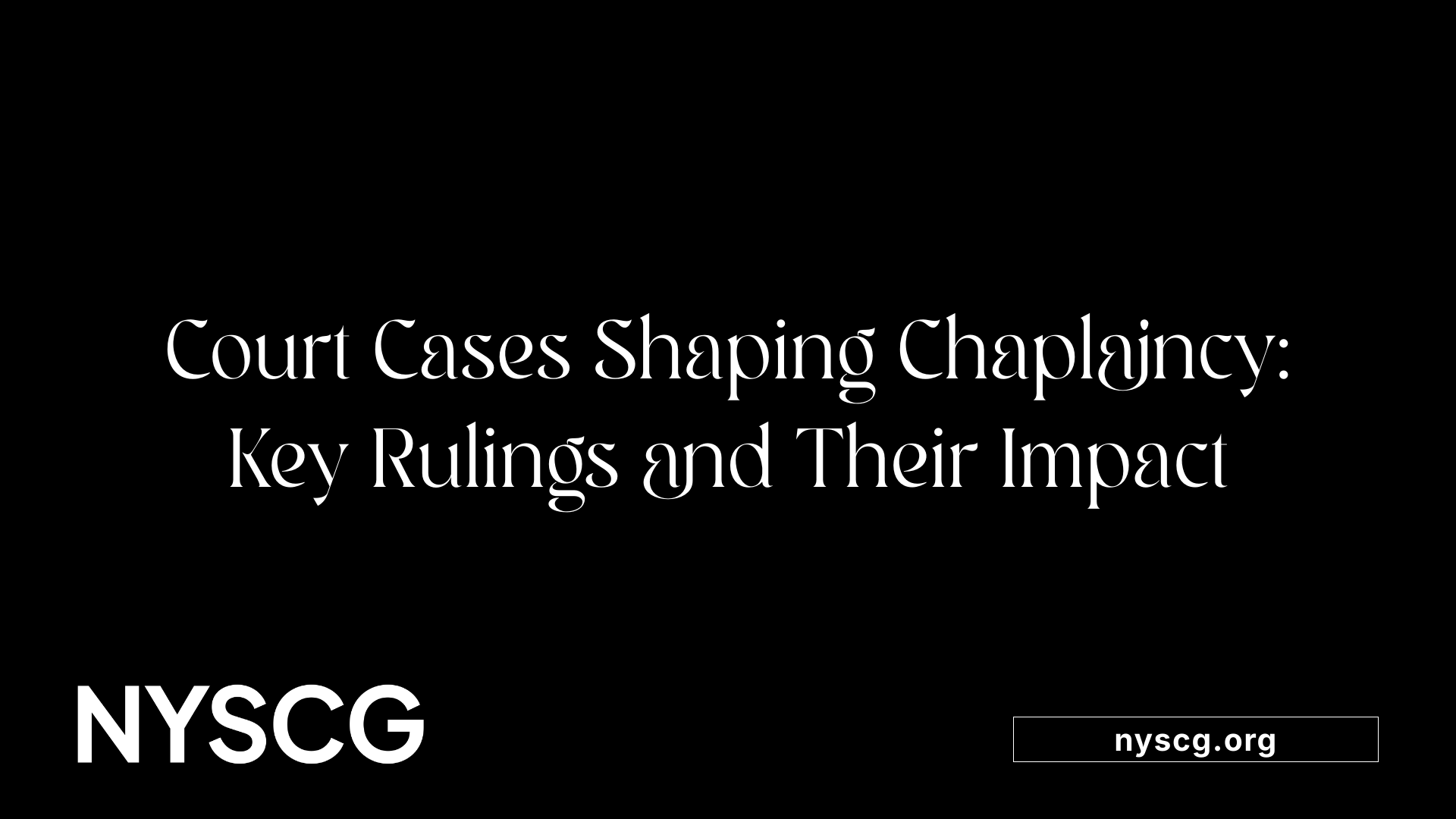
Court decisions and case law play a vital role in shaping the limits and protections of chaplains’ duties within government and institutional settings. One landmark ruling, Marsh v. Chambers (1983), upheld the constitutionality of legislative prayer, affirming that government-funded chaplains can perform religious functions in ways consistent with tradition. This case established that such practices are permissible as long as they do not violate the Establishment Clause and are rooted in historical practices.
Another significant case, Katcoff v. Marsh (1985), validated the military chaplaincy program, emphasizing that religious activities by military chaplains are protected when conducted in a secular, non-coercive manner. The court recognized that military chaplains serve a constitutionally sound purpose, provided their services respect religious diversity and do not impose specific beliefs.
These rulings demonstrate that chaplains are protected in their religious expression but must operate within constitutional parameters. They clarify the boundaries of permissible religious activities and support the exemption of chaplains from secular restrictions that would otherwise limit their spiritual duties.
In essence, court rulings reinforce that chaplains have the constitutional right to perform religious roles in public institutions, as long as their actions do not violate the principles of separation of church and state. These decisions continue to guide how chaplaincy services are provided and ensure the balance between religious freedom and constitutional limits.
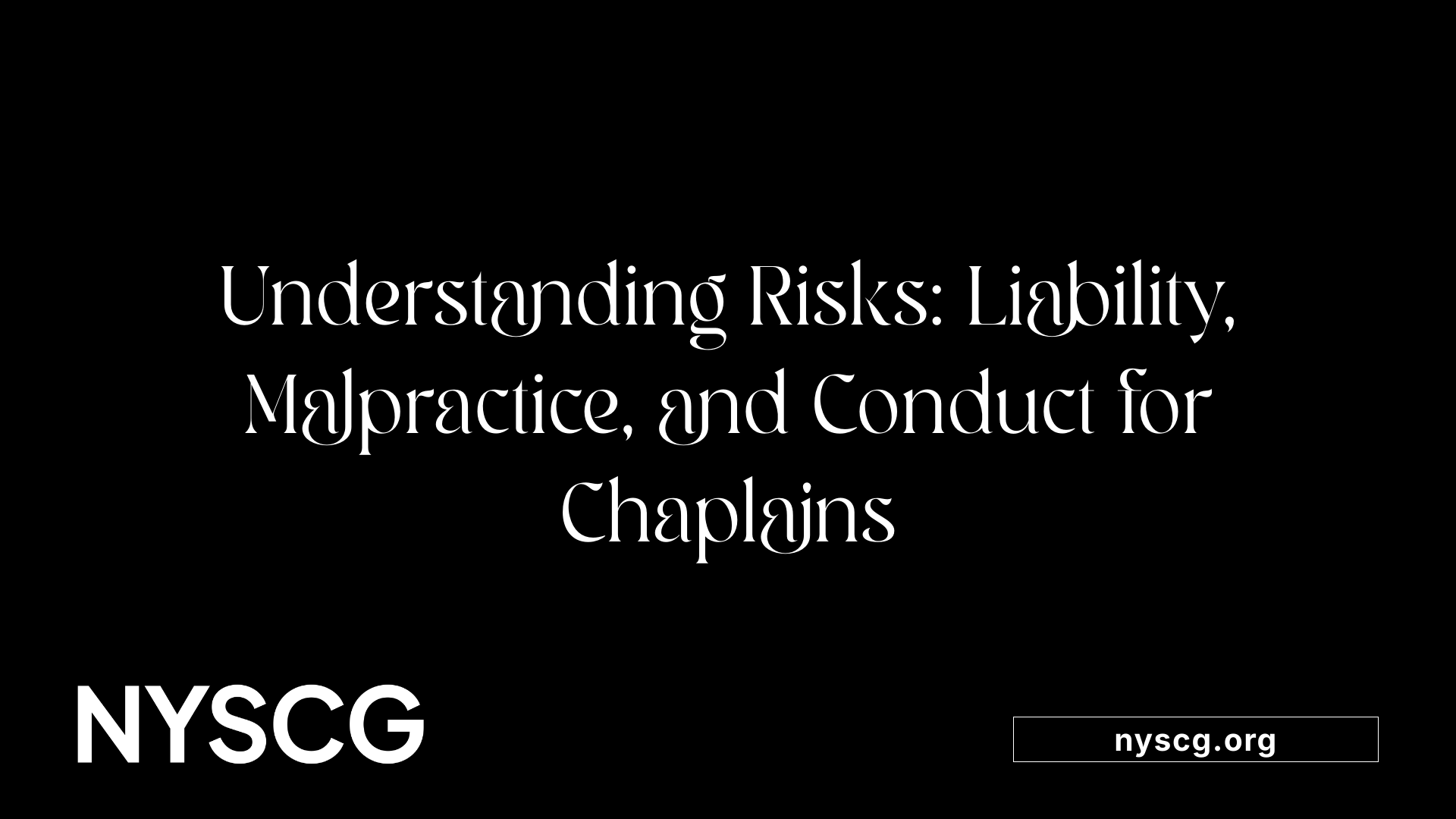
Chaplains operate in environments where they interact closely with vulnerable or emotionally distressed individuals. As a result, they face potential legal challenges such as malpractice claims, wrongful conduct allegations, and violations of privacy rights. These risks are particularly heightened when chaplains handle sensitive conversations, personal disclosures, or provide spiritual advice.
Malpractice claims could arise if a chaplain's advice or actions are perceived as negligent, harmful, or outside the scope of their role. Similarly, wrongful conduct, such as misconduct or inappropriate behavior, can lead to lawsuits or disciplinary actions. Privacy violations are also a concern, especially if confidential information is disclosed without proper authorization.
To protect themselves legally, many chaplains ensure their employer provides adequate liability coverage, including professional indemnity insurance. This coverage can help mitigate financial and legal consequences if a lawsuit is filed. Additionally, maintaining detailed documentation of interactions, following organizational policies, and adhering to ethical and legal standards are crucial.
Engaging in activities like providing counseling, prayer, or advice carries inherent legal risks if negligence or misconduct is proven. Therefore, it's essential for chaplains to operate within their professional boundaries, seek ongoing training, and stay informed about legal responsibilities. By proactively managing these aspects, chaplains can continue their vital work while minimizing exposure to legal liabilities.
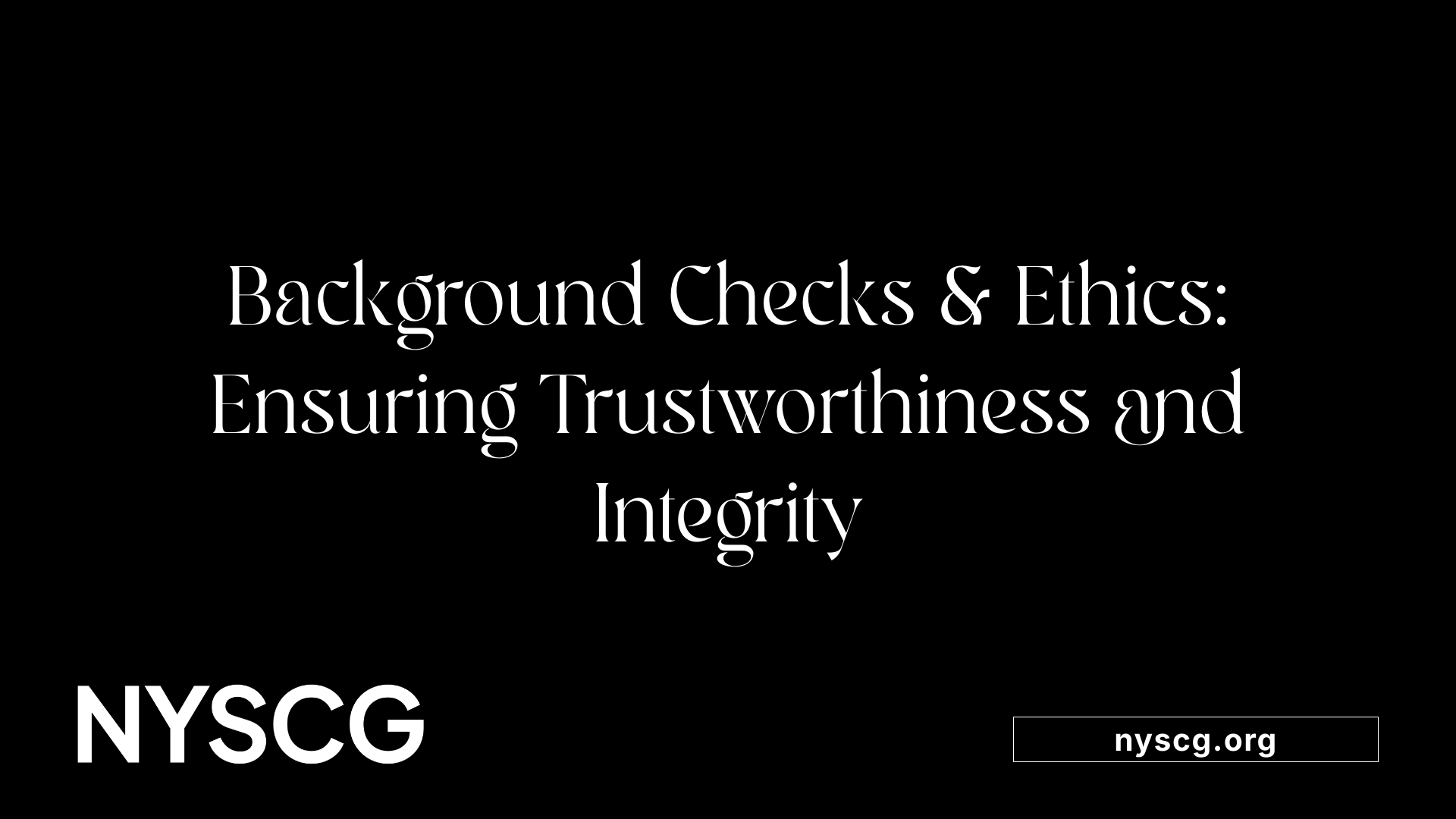
Yes, background checks are generally a standard part of the vetting process for chaplains across various institutions. These checks are essential to ensure that individuals entrusted with spiritual guidance and sensitive information are trustworthy and professional.
Typically, the process involves several components. Criminal record searches are conducted at local, state, and federal levels to identify any potential legal issues. Verification of licensure, ordination, and prior experience as a chaplain ensures the candidate’s qualifications and background in spiritual care.
In addition to criminal checks, organizations often perform driving record screenings, especially if the role involves visiting different locations or transporting individuals. Fingerprinting and reference checks by past employers or religious authorities may also be part of the process.
In some settings—such as hospitals, prisons, or law enforcement agencies—more extensive assessments are common. These may include financial background screenings or specialized background investigations through industry-specific providers.
Thorough background screening helps safeguard vulnerable populations and maintains organizational integrity. It ensures that chaplains uphold the highest ethical standards and operate within legal boundaries, fostering trust within the communities they serve.
Chaplains are expected to adhere to core ethical principles that include integrity, confidentiality, and respect for individuals' beliefs and backgrounds.
These principles form the foundation of professional conduct for chaplains, guiding their interactions and decision-making.
Chaplains hold a significant responsibility to maintain professionalism and establish clear boundaries. They must avoid overstepping in areas that could compromise their role or violate ethical norms.
This includes refraining from proselytizing or imposing beliefs upon individuals in care. Maintaining appropriate boundaries ensures that support remains respectful, voluntary, and non-coercive.
Chaplains are also responsible for ongoing training on ethical and professional standards. They should regularly review policies to prevent conflicts of interest, misuse of authority, or breaches of confidentiality.
Proper boundary enforcement is vital to protect both the individual’s rights and the integrity of the chaplaincy role. It helps uphold public trust and ensures the chaplain’s services align with legal and ethical expectations.
| Aspect | Details | Additional Notes |
|---|---|---|
| Background Checks | Criminal, licensing, ordination, reference, and sometimes financial screening | Ensures safety and trustworthiness |
| Ethical Principles | Integrity, confidentiality, respect | Foundation for professional behavior |
| Conduct Responsibilities | Boundary maintenance, non-proselytizing, ongoing education | Prevents misconduct and upholds standards |
Seeking a comprehensive understanding of background checks and ethical responsibilities is essential for maintaining the integrity and effectiveness of chaplaincy services.
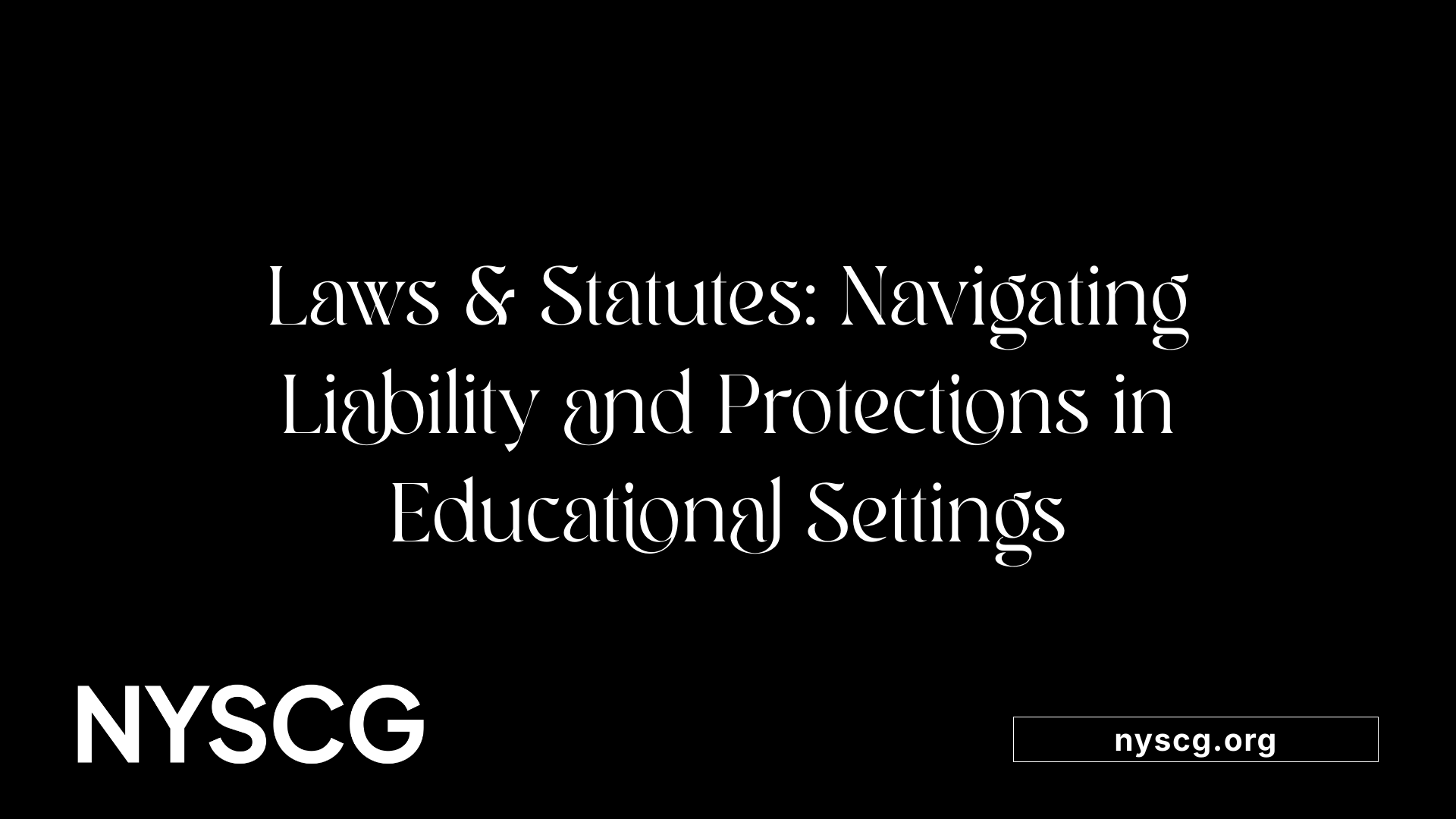
Laws and statutes related to chaplaincy programs, especially in educational settings, play a significant role in defining the scope of liability and legal protections for chaplains and volunteers. For example, in Florida, legislation permits school districts to involve volunteer chaplains to provide support to students. These laws typically include provisions that limit the liability of volunteers, ensuring that they are protected from certain legal claims if they act within their designated role and in accordance with organizational policies.
State laws often require parental written consent for students participating in chaplaincy programs or religious activities. Additionally, they mandate that schools publish information about volunteer chaplains, including their religious affiliations, promoting transparency and accountability.
Legal protections for volunteers are bolstered by federal laws such as the Volunteer Protection Act (VPA) and the Public Readiness and Emergency Preparedness (PREP) Act. The VPA generally shields volunteers from personal liability for negligence if they act in good faith and within scope, while the PREP Act offers immunity to certain health-related volunteer activities, which can include chaplaincy during emergencies.
These legal frameworks serve to encourage participation in volunteer programs by reducing fear of lawsuits and promoting safe, respectful environments. At the same time, they strive to balance this with accountability measures such as parental consent, public disclosures, and adherence to organizational policies.
| Law/Policy | Scope of Protection | Notable Requirements | Impact on Liability |
|---|---|---|---|
| Florida Chaplain Law | Volunteer immunity if acting within scope | Parental consent, transparency | Limits personal liability of volunteers |
| Volunteer Protection Act | Protects volunteers from negligence claims | Acting in good faith, scope of activity | Reduces fear of legal action for volunteers |
| PREP Act | Immunity during health emergencies | Specific emergency activities | Extends immunities to chaplain activities in crises |
In summary, specific statutes and federal laws create a legal safety net for chaplains and volunteers in educational and public settings, emphasizing lawful conduct, transparency, and the importance of acting in good faith. These protections support the continued involvement of volunteers, including religious leaders, while safeguarding their rights from undue legal risk.
Chaplains serving in military and government settings are protected by legal principles rooted in the First Amendment, which guarantees religious freedom and prohibits government endorsement of religion. These protections allow chaplains to perform religious activities without fear of censorship or lawsuits, as long as they operate within constitutional boundaries.
Courts have consistently upheld the legality of government-funded chaplaincy programs, emphasizing their voluntary and secular nature. For instance, in Marsh v. Chambers (1983), the Supreme Court recognized the long-standing tradition of legislative prayer, including chaplains, as compatible with the First Amendment.
Legal protections also come through specific legislation, such as the Military Chaplains Act, which affirms that military chaplains can carry out their religious duties while respecting constitutional limits. Judicial rulings reinforce that chaplains must avoid coercive proselytizing and remain neutral in their official capacity.
These legal immunities serve to enable chaplains to serve diverse communities across all faiths without fear of discrimination or legal repercussions. As long as religious activities conform to constitutional standards—namely, avoiding establishment of religion or undue endorsement—chaplains enjoy protections that support their vital role in both military and government environments.
Chaplains working in public institutions must navigate complex legal boundaries to avoid liability. If they engage in religious activities that violate constitutional protections, such as endorsing a single faith or coercing individuals, they can be subject to lawsuits.
Courts have consistently reinforced that government and public entities cannot promote or favor religion in a way that breaches the Establishment Clause of the First Amendment. This includes activities like public prayer, proselytizing, or religious messaging conducted by chaplains.
For example, conducting prayers during official government functions or in public schools without strict adherence to neutrality can lead to legal challenges. The key is ensuring that religious actions are voluntary, inclusive, and respectful of diverse beliefs.
Chaplains should avoid proselytizing or making religious messaging mandatory. They must also ensure that participation is voluntary and that their conduct does not imply government endorsement of any particular religion.
When chaplains perform within these legal standards, they typically remain protected. However, any deviation—such as using their position to promote specific religious views or to pressure individuals—opens the door for lawsuits.
Proper safeguards and adherence to neutrality are essential for chaplains to operate lawfully in public settings. This helps uphold individuals' rights and prevents government or institutional liability for unconstitutional religious conduct.
Chaplains operate within a complex legal framework that seeks to protect religious expression while upholding constitutional safeguards against government endorsement of religion. It is essential for chaplains, institutions, and legal professionals to understand the boundaries set by case law, statutes, and constitutional principles. While protections like First Amendment immunities provide strong defenses against certain lawsuits, risks remain—particularly around religious activities in public settings or actions that could be seen as coercive or exclusive. Clear policies, ethical conduct, legal awareness, and ongoing education are vital for chaplains to serve their communities effectively without risking legal exposure. Ultimately, navigating these legal considerations ensures that faith-based support continues to be a protected and respected element of public and institutional life.
All you need is the will to make the world a better place.
New York State chaplain group inc. is a tax deductible organization with a federal tax Id number 92-383-4921